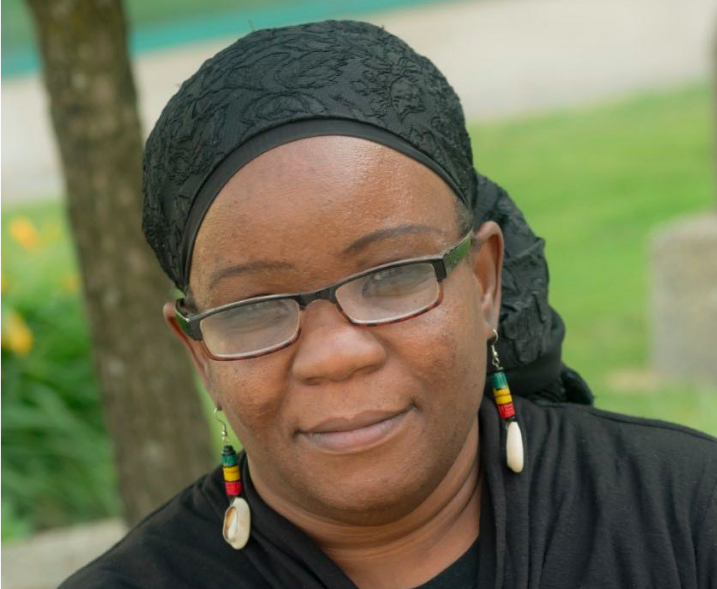
As of December 4, 2018, more than 23,000 people are locked up in the State of Wisconsin with thousands more on differing levels of community supervision, electronic monitoring and people who were formerly incarcerated.
To some, those numbers would suggest that criminals are just everywhere in Wisconsin. And, in some regards, they might be right. But that is simply because we have entered an era where every single thing is criminalized.
That was the overwhelming message that Mariame Kaba delivered a talk to a crowd of over 200 people in the Deluca Auditorium at the Discovery Center on UW campus as part of the University of Wisconsin’s Distinguished Lecture Series. The audience, mostly students, were presented with the bare facts of mass incarceration and the ripples of the effects it has had on the community.
Kaba, who founded Project NIA, an organization seeking to end youth incarceration, said she feels that incarceration in and of itself is violent. Looking for ways to provide alternatives to incarceration while simultaneously providing accountability for perpetrators has become her life’s work. Kaba won the 2017 Peace Award as well as the 2017 Ron Sable Award for her work.
“Real community safety is not widening the web of criminalization,” Kaba said. “We need organizations that don’t support criminalization. We can not have prisons being used as mental health providers.”

People experiencing mental health episodes, people struggling with addiction issues, people who have become desperate as a result of economic challenges and poverty, and immigrants are all categories of human beings that have been criminalized in Wisconsin (and nationally).
For Kaba, some of those folks could have used a different type of intervention. She wondered out loud just what social workers were used for nowadays. She made it clear that someone having a mental health episode shouldn’t be flung into the back of a squad car and taken to jail. Having police perform wellness checks instead of health professionals, she said, makes no sense to her.
Community leaders around Madison have long been calling for reforms not just of the way policing is done, but asking for a new way to conceptualize incidents people have and whether or not locking them up in a cage should be the answer to everything.
During her presentation, Kaba talked about the need for more restorative uJstice programming and concepts. Restorative justice has many levels, but the most commonly used method often involves a meeting between a person who has committed a wrong and the person they have wronged.
One organization that has been working on progressive, cutting-edge models for restorative justice is a group called Common Justice. They operate an alternative-to-incarceration and victim-services program that’s all about focusing on the survivors of violent felonies and providing meaningful accountability for the people who committed them.
The group often brings survivors or the families of victims who did not survive a violent incident face-to-face with the person who did it. Each group shares feelings about what transpired, what their lives are like now, and connect in an emotional way. Often times, it is more powerful than any incarceration.
Kaba shared a video called Donnell’s ever-after story. Myeverafter is a series of videos made in conjunction with Common Justice that show some of the restorative justice work. Donnell’s video was powerful and dealt with his connecting with the family of a person whom he harmed, but who thankfully recovered.
Locally in Madison, members of the First Congregational Church of Christ off Campus Drive participate in Restorative Justice programs inside of Wisconsin’s prisons.
The need for advancements in restorative justice was the heart of Kaba’s presentation. But so were many other reforms. After she showed Donnell’s video, she spoke at length about the need to reduce other forms of incarceration in addition to prisons.
Ankle bracelets, GPS monitoring and other forms of surveilling people is equally damaging in being invasive to someone’s life.
“Please, no more ankle shackles,” Kaba said. “When your home is the jail, how are we gonna end jails? E-carceration is even worse than what we have now. I can easily see us having judges giving someone 50 years on an ankle bracelet and saying it’s okay because the person’s at home.”
Home and school are no longer places where someone might feel a sense of privacy or safety. Police patrol schools and intervene in-school disciplinary incidents at an alarming rate. For some students, the heavy-handed police presence has been torturous.
“If we can’t get police out of schools, we can’t get them out of anything,” Kaba told the audience. “Police are not school counselors.”
Following the presentation, Kaba opened the floor for a Q&A for several minutes.



